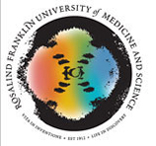- Privacy Policy
- Terms & Conditions
- Contact us
- ©Isabel Healthcare 2025
Medical School Teaches with Isabel Diagnosis Tool
 Rosalind Franklin University of Medicine and Science (RFUMS) in North Chicago, Illinois has used the Isabel Healthcare diagnosis decision support tool as part of its medical curriculum since 2007. The Chicago Medical School at RFUMS offers a doctor of medicine graduating 190 students each year and is a national leader in inter-professional medical and healthcare education.
Rosalind Franklin University of Medicine and Science (RFUMS) in North Chicago, Illinois has used the Isabel Healthcare diagnosis decision support tool as part of its medical curriculum since 2007. The Chicago Medical School at RFUMS offers a doctor of medicine graduating 190 students each year and is a national leader in inter-professional medical and healthcare education.
WHY USE ISABEL WITH STUDENTS?
RFUMS faculty noticed that students frequently tend to use familiar, though potentially less credible clinical resources such as Google or Wikipedia to inform their learning and clinical decisions. As a result of these observations, the administration decided to look for a tool that could be used to provide trustworthy, and accurate medical information as well as lend support to their curriculum in safety, prevention and professionalism. RFUMS has found Isabel to be a helpful addition to their curriculum and training.
AVOIDING PREMATURE CLOSURE
Developing student clinical reasoning skill is an essential component of medical training. Since electronic informatics tools are regularly used to help physician’s refine their diagnostic accuracy in clinical settings, RFUMS sought to find a tool to help their students learn the diagnostic reasoning process, refine their diagnostic accuracy, and learn about the causes of diagnostic error, including premature closure. Due to their relative inexperience, students are more prone to premature closure, a phenomenon where a physician considers a patient’s symptoms to be evidence of one specific diagnosis and then stops considering other reasonable possibilities. While more common in student populations, diagnostic errors occur in practicing professionals and are often the result of a physician not considering other likely options.
ISABEL: MANDATORY IN MED SCHOOL TRAINING
RFUMS now includes use of Isabel in various parts of their curriculum, specifically as students learn how to interview a patient develop and initial differential diagnosis. At RFUMS, Isabel is a mandatory component of training for the University’s Chicago Medical School students. In addition, all RFUMS students and faculty, including the College of Health Professions and the Dr. William M. Scholl College of Podiatric Medicine, have access to it for the purpose of educational instruction and learning.
According to John Tomkowiak, M.D., M.O.L, Associate Dean for Curriculum and Jim Carlson, MS, PA-C, Director of Interprofessional Simulation at RFUMS, one of the hardest skills to teach medical students is the ability to reason and recognize ones own limitations – it is this skill that differentiates the average clinician from the excellent one.
“Educators have consistently looked for approaches to not only teach this essential skill, but to assess it. With the new Isabel system, we can do both,” he said. Dr. Tomkowiak noted that computer technology is rapidly gaining momentum in hospitals and medical practices around the country. Having students learn and understand its benefits and limitations will allow them to be better prepared to practice when they are on their own, he said.
To evaluate their students, RFUMS measures the impact of using Isabel on the quality of their differential checklist before and after use of the system. Second year medical students use Isabel during the patient interview process in order to help guide them in initial data gathering (history and physical) while the fourth year students use Isabel to improve the quality and accuracy of their differentials after taking a history.
ISABEL GETS YOU THINKING
The medical school created and launched its own internal study of the usage of Isabel. RFUMS found in their observations and study that Isabel helps students collect important historical and physical information as well as develop a more accurate list of differential diagnoses. As one student commented, “Isabel gets you thinking about what you are supposed to be thinking about.”
The RFUMS administration believes that Isabel is a valuable education tool for their environment specifically because it provides active versus a passive participation in the learning process. “Isabel helps our students actively pull out the clinical information to make better decisions,” stated Mr. Carlson.
Subscribe Here!
Recent Posts
Isabel DDx Companion with ChatGPT Integration - to help you diagnose even faster
At Isabel Healthcare, we’ve always been driven by one goal: to make clinical reasoning faster,..Virtual Triage: Do more questions lead to better patient outcomes?
One of the common misconceptions related to virtual triage / symptom checker tools is that the more..List Of Categories
- Differential Diagnosis Decision Support
- Differential diagnosis
- Symptom Checker
- Symptoms
- Medical Error
- Patient Disease Information
- Disease
- Clinical Decision Support
- Diagnostic Decision Support
- Isabel 1 Minute Read
- Diagnosis Error
- Diagnosis Skills Cases
- Healthcare Informatics
- Clinical Reasoning
- Evidence-based Medicine
- Medical Education
- Patient Engagement
- Symptom Triage
- Nurse Practitioner Education
- Nursing Decision Support
- Partnership
- Public Health
- COVID-19
- EHR
- Patient Empowerment
- Patient Safety
- rare disease

Start your FREE Trial today
Try the Isabel Pro DDx generator for 30-days - no payment card details required.





